
Related
Guests
- Nikkita Oliverartist, attorney, community organizer and co-executive director of Creative Justice in Seattle.
- E.D. Mondainécivil rights activist and president of the Portland branch of the NAACP.
As nationwide protests against systemic racism and police violence stretch into their second month, President Trump has sent a team of federal agents to Seattle, following a controversial deployment of federal forces in Portland, Oregon. “We don’t know exactly what the federal officers are doing. What we do know is we are in a situation where local police are welcoming those federal agents into our city,” says Seattle community organizer Nikkita Oliver, co-executive director of Creative Justice. We also speak with Pastor E.D. Mondainé, president of the Portland, Oregon, branch of the NAACP.
Transcript
AMY GOODMAN: For the 60th day in a row, demonstrators rallied in Portland, Oregon, Sunday to protest against police brutality and racism, as well as the deployment of federal forces to the city. Shortly after midnight this morning, federal officers fired tear gas and other so-called less-than-lethal weapons to disperse a crowd that gathered outside the federal courthouse, which has become a flashpoint of the nightly protests.
The weekend demonstrations in Portland came days after the Portland City Council unanimously voted to bar Portland police officers from cooperating with federal authorities. On Saturday, federal authorities revealed they had arrested or detained 60 people since being deployed to Portland in early July. Meanwhile, Oregon Congressmembers Earl Blumenauer and Suzanne Bonamici and about a dozen other lawmakers are demanding the resignation of Chad Wolf, the acting head of the Department of Homeland Security, over his handling of the protests.
President Trump’s deployment of federal officers to Portland and other cities sparked a new round of protests around the country this weekend. On Thursday, the Trump administration sent a team of federal tactical border officers to Seattle, Washington. In a statement, the Federal Protective Service said, quote, “The CBP team will be on standby in the area, should they be required.” It remains unclear what role the agents played this weekend as Seattle police arrested dozens of protesters and fired flash grenades and pepper spray into crowds.
Protesters also took to the streets in other cities, including Oakland; New York; Los Angeles; Louisville, Kentucky; Omaha, Nebraska; Richmond, Virginia; Aurora, Colorado; and Austin, Texas, where a protester named Garrett Foster was shot dead. Foster’s mother said her son was pushing his fiancée’s wheelchair when a car drove into the crowd and opened fire.
We begin today’s show in Seattle and Portland. In Portland, we’re joined by Pastor E.D. Mondainé, a civil rights activist, president of the Portland, Oregon, branch of the NAACP. And in Seattle, Washington, Nikkita Oliver is with us, co-executive director of Creative Justice. She’s also an artist, attorney and community organizer with Decriminalize Seattle and King County Equity Now.
We welcome you both to Democracy Now! Nikkita Oliver, let’s begin with you. Can you explain what’s happening in Seattle right now, with President Trump saying, as part of this “surge,” they’ve brought federal agents in on, quote, “standby”? Talk about the protests this week and what this means.
NIKKITA OLIVER: Yeah. So, this weekend, many people took to the streets. And I want to make sure that we keep the focus on Black lives. You know, ultimately, people are in the streets in defense of Black lives; however, it cannot be ignored that Trump sending federal officers to our city has certainly further emboldened the protests.
That being said, we don’t know exactly what the federal officers are doing. What we do know is that we are in a situation where local police are welcoming those federal agents into our city. The head of the local police union, the Seattle Police Officers Guild, went on conservative radio about a week ago, praising the federal arrests of protesters in Portland and saying it might be time for the feds to come to Seattle.
You know, this past weekend, we also saw a renewed violence by Seattle Police Department against protesters. And they actively had been fighting against a ban on tear gas and rubber bullets that the Seattle City Council imposed. And the Trump Department of Justice essentially backed the Seattle Police Department in lifting that ban. And so, we know that in addition to fighting police in our own city, we are also fighting at the federal level against federal enforcements being sent to our city.
AMY GOODMAN: Can you talk about how you’re protecting yourselves? You tweeted, “Police are snatching up umbrellas, traffic cones and gas masks from protestors. These are literally protective gear to keeps protestors safe from police violence.”
NIKKITA OLIVER: Absolutely. You know, a lot of new tactics are being developed in the streets to keep people safe, such as umbrellas, mutual aid networks to disperse protective goggles. People are wearing bike helmets and construction helmets as a way of protecting ourselves from the debris of flashbangs. Even this weekend, we saw Seattle police dropping flashbangs from the top of private roofs. And so, people are developing many tactics within the streets to keep each other safe. And I think that is really the important part. People are protecting each other the way that we always have, knowing that when it comes to police violence, we, as a community, are really what we have as our safety. Street medics are playing a key role and often putting theirselves at great personal risk to take care of people on site.
But we know that ultimately, you know, the best protection that we’re looking for isn’t just these tactics that we’re developing right now in this moment, but it is an overarching protection against police violence, where we have less police. You know, people are staying in the streets in defense of Black lives, and the demand currently on the ground here is to defund SPD by 50% in both the rebalancing package of our city, as COVID-19 has caused a $300 million shortfall, but also in the next upcoming budget, as a tactic for decreasing police violence across the board. So, while we are developing many tactics on the ground and the street to keep people safe from pepper spray, various CO gas, flashbangs, there’s also an overarching work that’s happening to how do we keep people safe from police violence across the board.
AMY GOODMAN: So, Nikkita Oliver, some 5,000 protesters stopped at a youth detention center. Can you talk about the history of that place?
NIKKITA OLIVER: The protests that we’re seeing right now are literally built on years of a growing abolitionist movement in the Seattle-King County region. One of the fights that began in 2012 was to stop King County from building a new $244 million youth jail and a new court complex. There was an entire generation of young people, or there is an entire generation of young people, since 2012, who have literally come of age fighting the construction of this new youth jail. And it opened earlier this year. And a part of combating state-sanctioned violence, overpolicing, police brutality in our city is also acknowledging that the criminal punishment system is deeply attached to policing in Black, Indigenous and people of color neighborhoods. Last week, very significantly, the King County executive, Dow Constantine, who was the biggest cheerleader of building the youth jail, announced that in 2025 they will attempt to close the youth jail. There are presently somewhere between 19 and 21 young people being held in cages in that facility.
We know that without the groundwork that Black and Native folks have led in our city to stop the building of the youth jail, to stop the building of police bunkers, that the work we’re presently doing right now around defunding the police would not have the foundation that it has. When the uprising began this summer, we already had demands ready, because we have been, for an extended period of time, fighting this new youth jail. And so, two coalitions — Decriminalize Seattle and King County Equity Now — really rose out of that work. So, keeping our sights on that movement of no new youth jail, of closing down youth prisons but also closing down adult prisons within our region, has been a significant part of laying the foundation for this present uprising for Black lives.
AMY GOODMAN: I wanted to go to a Portland Black Lives Matter protester addressing the crowd last week.
PROTESTER 1: We pose no threat! The only threat that we pose is sealing the deal on being divided. We will not be divided ever again! We are one nation under God!
PROTESTER 2: God bless America!
PROTESTER 1: We are the human race! Black Lives Matter!
PROSTERS: Black Lives Matter!
AMY GOODMAN: That’s a scene from the streets of Portland, Oregon. In addition to Nikkita Oliver, we’re joined by Pastor E.D. Mondainé, who is a civil rights activist, president of the Portland, Oregon, branch of the NAACP, recently wrote a piece for The Washington Post titled “Portland’s protests were supposed to be about black lives. Now, they’re white spectacle.” Can you explain, Pastor?
PASTOR E.D. MONDAINÉ: Well, we’re right now in the era that is very serious. We have to embrace the civil rights era with seriousness, and more seriousness than we’ve done in the 60 years since we’ve seen it, since its inception. The shallow graves of our clarion criers for justice have now reached the streets of Portland through the stench of tear gas and rubber bullets.
At the core of the Trump administration’s actions in Portland are a deception. We’re at war. The federal government’s response is no display of strength; rather, it’s a deliberate cover-up for Trump’s weakness. The president and his allies want to be — want this to be a spectacle, be it a naked yogi or the next display of shocking force in force. They need to be a distraction to the country by engaging our movement into empty battles where there is no advantage. When we engage on their terms, we certainly, most definitely, lose.
But we’ve got to be able to keep the focus on Black lives. This is not a war. We’re not in Beirut. We are in the United States of America, the most powerful country in the world. And we need to understand that this revolution has brought us here to the streets, and it’s going to keep us into the streets until we see great movement.
AMY GOODMAN: Oregon Senator Ron Wyden, talking about the federal agents that Trump has deployed to Portland as essentially fascist, he said, “If a line is not drawn in the sand right now, America may be staring down the barrel of martial law in the middle of a presidential election.” Do you share that assessment, Pastor Mondainé?
PASTOR E.D. MONDAINÉ: Yes. And we can’t fall for that deception. We can’t settle for martial law. We know where that’s going to take us. Listen, it is time now for us to make our voices known and voices heard in the halls of justice. We welcome the protesters. We don’t necessarily — we’re not attracted to the violence, but that’s all a part of the game. War is deception. And deception is what kills our nation when we’re not settled in understanding what truth is and how to divine that truth. We need to be able to march forward with the power that revolution brings and that tells us that it’s time right now for the social change that we’re seeking.
AMY GOODMAN: Can you talk — I mean, the scenes in the streets of Portland, thousands of people, you have a wall of moms and now a wall of dads. You’ve got that wall of veterans that have lined up, as well. Can you talk about the various movements that have come together, and what you think is the critical agenda of the Black Lives Matter movement right now?
PASTOR E.D. MONDAINÉ: Well, everyone seeking to advance justice in Portland, they’re facing great danger. And I want to be clear: We welcome our white allies in the street. We welcome the wall of moms. We welcome the leaf-blowing dads. Right now there are unmarked, unarmed federal forces kidnapping our citizens off the streets without justification or authority. The mayor of Portland and the governor of Oregon have both asked them to leave, and it’s all to no avail. We know that this is a violation of our Constitution. But with President Trump promising only more occupations in more cities, we ignore this risk at our peril. You know, at their core, the Trump administration’s actions are really hurting America, and not bringing America closer together.
But again, the focus has to be on Black lives and Black Lives Matter. It is Black lives and Black Lives Matter that took us to the streets. It is Black lives and Black Lives Matter that keep us in the streets. It’s a Black lives issue that keep us downtown nightly in the face of peril and trouble.
AMY GOODMAN: Nikkita Oliver, what are you demanding of the state right now in Seattle, Washington? And I’ll ask the same question of the pastor. I mean, you have, interestingly, the authorities in Oregon, from the governor to the senators to the mayor, Ted Wheeler, who’s also the police commissioner, who was tear-gassed himself, vehemently protesting the presence of federal agents. But you also have the local police tear-gassing people. And explain — although they recently, the Portland City Council, last week, voted not to cooperate with the federal agents, explain the situation in Seattle right now.
NIKKITA OLIVER: You know, I want to be very clear that while certainly we are against federal agents being in our city and our county, we are not fighting for a local monopoly on police violence. We are fighting, and, you know, a huge focus of our movement is we’re fighting to defund the police. And very specifically, King County Equity Now and Decriminalize Seattle are fighting to defund the Seattle Police Department. We know that there is no instance in which police actually keep us safe, that very often when police are called in to any situation, they tend to escalate it, or people involved in that situation are sent into the criminal punishment system, which is disproportionately made of Black, Indigenous and people of color.
And so, there are three key demands that have remained at the forefront of our movement and in this fight to defend Black lives. The first is to defund the Seattle Police Department by 50%, starting first with the rebalancing package. And Seattle City Council will have an historical vote on either August 3rd or August 10th, depending on how the process goes, where councilmembers will vote on that 50% package first with the 2020 rebalancing. We have seven of nine councilmembers, so this is a veto-proof vote, that have committed to defunding Seattle Police Department by 50%. And there is a strong chance that we will see some defunding on this rebalancing package, but our focus is also very much on the 2021 budget, and those councilmembers are committed to finding those cuts within the Seattle Police Department. But that’s only one strategy.
The next strategy is knowing that we need a community-based, community-led community safety and public health infrastructure. And so, part of the first defund dollars from this 2020 package, from the rebalancing package, should be and will be invested in a participatory budgeting project that will be led by those communities most affected by police terrorism. And that participatory budgeting process will lead us into 2021 to determine how those 50% investments of the current $410 million, the Seattle police budget — so that’s about $205 million — will be invested in community-based public health and public safety, and will invest as soon as possible $10 million in scaling up the current community-based infrastructure. So we have kept a very strong focus on understanding that defunding the police, shrinking the police, is a really important strategy to getting to the place where we don’t have police involved in our public health or public safety infrastructure.
And then, finally, since May 29, hundreds of protesters have been arrested. And so our movement is calling for all protesters to be freed. No one should be taking a case or a charge by exercising their First Amendment right, especially as it comes to defending Black lives and fighting against state-sanctioned violence.
AMY GOODMAN: And what is the role you see of white allies, of other people of color, in a Black lives-led movement?
NIKKITA OLIVER: I believe that our co-conspirators are an essential part of this movement, especially in a region like Seattle-King County. We are about 4% Black community within our city, and so having good, strong allyship — and I use “co-conspirator” very intentionally. You know, allies are people who may look at your struggle and say, “We align with you. We see the value of your life.” But that’s not necessarily folks who will join you in the streets, who will join you in council chambers, who will take a risk of their own lives or their own wealth or their own property in order to join your movement. So, in a city like ours, where the Black community has been displaced and gentrified out of the neighborhoods that we have made strong and popular — and, in many ways, the Black community has not had access to the immense wealth that has grown in our region — having those co-conspirators is essential in the streets, but also in many of our political strategies.
What I will say is, this current uprising is the first time that we have seen a considerable amount of our white allies and white co-conspirators take to the streets in a sustained movement. For the past 60 days, we have seen thousands upon thousands of people in Seattle consistently protesting, consistently rallying and consistently focusing on the three demands that the Black liberation movement here in our city and our region has brought to the surface.
And so, it really is essential that we have that co-conspirator movement happening at the same time, while simultaneously recognizing that no movement is successful without a diversity of tactics. We know historically we’ve had to see a diversity of tactics put in place in order to win, in order for movements to remain strong, and so we are also seeing that happening on the ground here, from movements in the streets to movements in council chambers to movements of educators and people all over our city, in order to ensure that the movement in defense of Black lives is present in every aspect of our movement work.
AMY GOODMAN: And, Pastor E.D. Mondainé, you have this massive, sustained protest movement in Portland, which is the whitest large city in this country, the whitest of the 35 largest cities. The New York Times wrote, “The state was founded on principles of white supremacy. A 19th-century lash law called for whipping any Black person found in the state. In the early part of the 20th century Oregon’s Legislature was dominated by members of the Ku Klux Klan.” And you have a very interesting piece in The Atlantic that said — that talks about the 13th, the — “With the passage of the 13th, 14th, and 15th amendments, Oregon’s laws preventing black people from living in the state and owning property were superseded by national law. But Oregon itself didn’t ratify the 14th Amendment — the Equal Protection Clause — until 1973.” This history, to say the least, resulting in a very white state. What you want to see happen now?
PASTOR E.D. MONDAINÉ: Well, I am thrilled that we’re seeing so many new members come out to join us as allies. And just as my sister spoke, the allies will go with you to the gate, but they become accomplices when they go out into the streets with us, when they join us in our fight. In the fight for restorative racial justice, in our different roles, we’ll walk together through this battlefield, wherever it goes and wherever it takes us, and however it fulfills those efforts that we are trying to obtain: Black lives mattering and not being three-fifths human. In this battle, some of us will find our greatest call to service in helping open the gates and guard those perimeters that Black people deserve to live in. Again, this is the only state in the nation that was incepted in racism. There is a place for all of us here.
We are in a historic time in America, a time that we’ll never see again. And the reality of the everyday Black existence has been promoted to the greater public’s consciousness. We have woke up in this country. We are wakened now. And we’re wakened by the sound of, again, those clarion criers that were killed in the '60s. Their blood is calling from the mud, and they're saying it’s time for justice, it’s time for change.
AMY GOODMAN: Pastor E.D. Mondainé, I want to thank you for being with us, president of the Portland, Oregon, NAACP, joining us from Portland, and Nikkita Oliver of Creative Justice and Decriminalize Seattle, joining us from Seattle.
Next up, as John Lewis is buried this week, we remember the civil rights icon and speak with Princeton University professor Eddie Glaude about his legacy, about Black Lives Matter and about his new book, Begin Again: James Baldwin’s America and Its Urgent Lessons for Our Own.
[break]
AMY GOODMAN: Music from Congressmember John Lewis’s memorial service in Selma, Alabama, over the weekend.

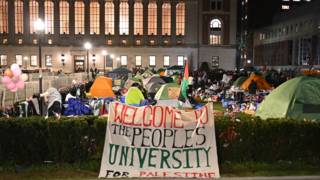
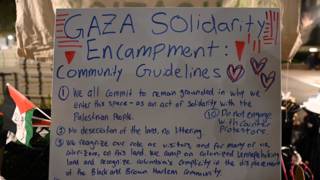
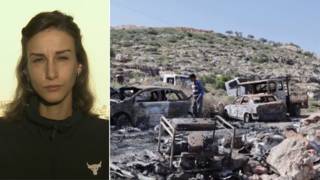
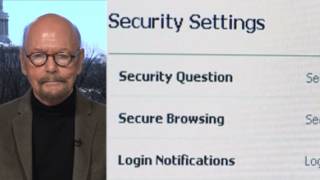





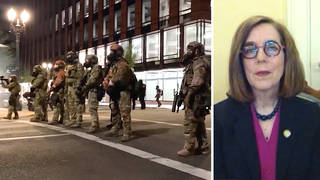

Media Options